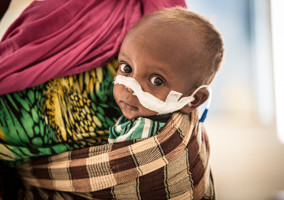The Disasters Emergency Committee’s East Africa appeal has raised more than £36m in the 11 days since it launched, it announced yesterday.
The DEC, which is made up of 13 Leading UK aid agencies, launched the appeal on 15 March to help millions of people facing hunger in East Africa.
Saleh Saeed, chief executive of the DEC, said: “The response has been phenomenal. I cannot thank the British public, trusts and companies enough for their generous support to the DEC East Africa Crisis Appeal, which has now raised an incredible £36m.
“Our member charities are already on the ground providing life-saving assistance to some of the worst affected people. Your generosity is helping them step up their response, providing more food, water and medical care to millions of people across East Africa who are in dire need.”
The appeal has been shown on all major UK broadcasters including BBC, ITV, Channel 4, Channel 5 and Sky.
Six million children could be without education
The DEC has also warned that six million school children in East Africa will have their education disrupted if funds aren’t raised and aid does not get through.
It said that figures released by the UN Office of Humanitarian Affairs showed that in Somalia and Ethiopia, nearly 340,000 school children are being forced out of education due to schools temporarily closing and in Kenya, 175,000 pre-primary and primary school children in ten counties are out of school due to the impact of drought.
In South Sudan, statistics released by Unicef in 2016 showed 51 per cent of children who are primary and lower secondary school age are out of education; the highest proportion of children not attending school in the world.
In Kilifi county, south of Kenya, a lack of rainfall has led to crop failure and livestock deaths. Food is scarce and there isn’t enough to go around. At one local school, 14 per cent of pupils have dropped out due to lack of food at home and only 15 pupils sat their national exams this year.
Tanya Barron, chief executive of Plan International UK, said: “Keeping girls and boys in education is incredibly important, especially in a time of crisis. Going to school maintains a sense of normality, keeps up their learning and is also where other key services can be delivered. In the long run it will also help them break the cycle of poverty, which is so important for the future of East Africa.”
Related articles












